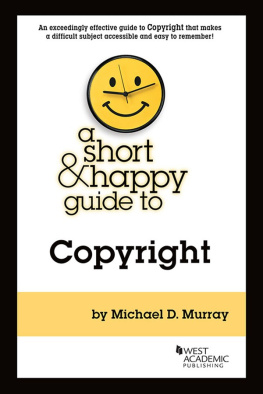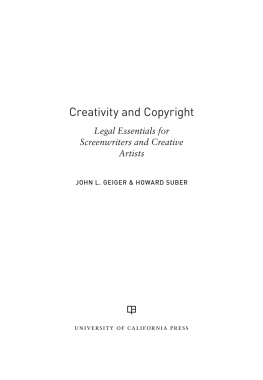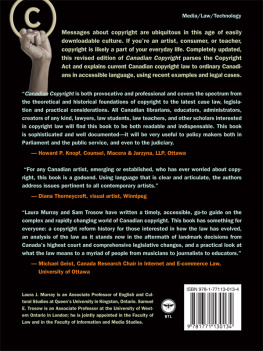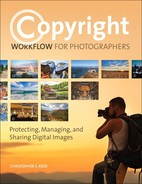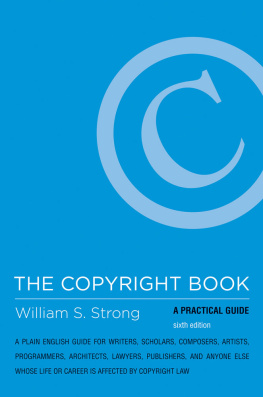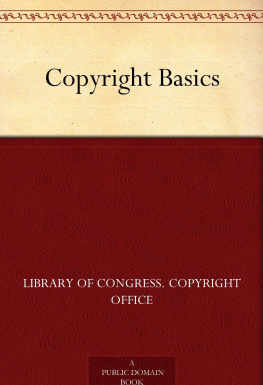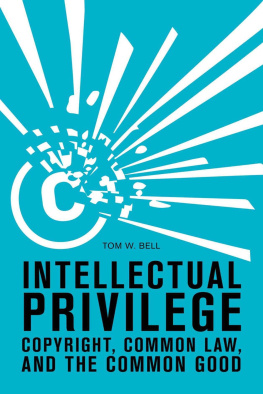West Academic Publishings Law School Advisory Board
Jesse H. Choper
Professor of Law and Dean Emeritus,
University of California, Berkeley
Joshua Dressler
Distinguished University Professor, Frank R. Strong Chair in Law
Michael E. Moritz College of Law, The Ohio State University
Yale Kamisar
Professor of Law Emeritus, University of San Diego
Professor of Law Emeritus, University of Michigan
Mary Kay Kane
Professor of Law, Chancellor and Dean Emeritus,
University of California, Hastings College of the Law
Larry D. Kramer
President, William and Flora Hewlett Foundation
Jonathan R. Macey
Professor of Law, Yale Law School
Arthur R. Miller
University Professor, New York University
Formerly Bruce Bromley Professor of Law, Harvard University
Grant S. Nelson
Professor of Law, Pepperdine University
Professor of Law Emeritus, University of California, Los Angeles
A. Benjamin Spencer
Earle K. Shawe Professor of Law,
University of Virginia School of Law
James J. White
Robert A. Sullivan Professor of Law Emeritus,
University of Michigan

Copyright
Michael D. Murray
University of Massachusetts
School of Law
A SHORT & HAPPY GUIDE SERIES

The publisher is not engaged in rendering legal or other professional advice, and this publication is not a substitute for the advice of an attorney. If you require legal or other expert advice, you should seek the services of a competent attorney or other professional.
a short & happy guide series is a trademark registered in the U.S. Patent and Trademark Office.
2017 LEG, Inc. d/b/a West Academic
444 Cedar Street, Suite 700
St. Paul, MN 55101
1-877-888-1330
Printed in the United States of America
ISBN: 978-1-68328-940-1
About the Author
Professor Michael Murray currently teaches at the University of Massachusetts School of Law. He previously taught at the University of Kentucky College of Law, the University of Michigan Law School, Valparaiso University School of Law, the University of San Diego School of Law (in Florence, Italy), the University of Illinois College of Law, and Saint Louis University School of Law. He practiced law at Bryan Cave LLP law firm after clerking for U.S. District Judge John F. Nangle in the Eastern District of Missouri. Professor Murray graduated from Columbia Law School (JD, Harlan Fiske Stone Scholar), Loyola UniversityMaryland (BA, summa cum laude, Whelan Medal), and from Fudan UniversityShanghai (Grad. Cert.).
Professor Murray is a busy scholar in the areas of copyright, trademark, right of publicity, and many other art law topics. In addition to his law review and journal articles, he is the author or co-author of Art Law in a Nutshell (West Academic); Right of Publicity In A Nutshell (forthcoming, West Academic); Art Law Deskbook : Artists Rights in Intellectual Property, Moral Rights, and Freedom of Expression ; First Amendment and Censorship ; The Deskbook of Art Law ; and Art Law: Cases and Materials . He also is the co-author of the LRW Series of books at West Academic-Foundation Press, whose recent titles include Advanced Legal Writing and Oral Advocacy: Trials, Appeals, and Moot Court 2d ; Legal Research Methods 2d ; and Legal Writing and Analysis 2d .
Table of Contents
Victor Whitmill v. Warner Brothers , and the
Copyrightability of Tribal Tattoos
Independent Creation of Works That Embody the Same
Idea
Works Made for Hire and Copyright
Ownership
Avoid Work Made for Hire QuestionsJust Buy the
Copyright
Why Is There a Fair Use Escape Hatch Built into
Copyright Law?
Step Seven: Does the Defendant Have a Fair Use
Defense?
A Short & Happy Guide to Copyright

Introduction
Copyright Law
All lawyers can benefit from a basic understanding of copyright law. Modern law practice strives to provide services and answer client needs across a growing variety of areas of commerce and law. Firms strive to be a one-stop solution for all of their clients needs. And in these time of growing reliance on technology, big data, visual and audio media, and digital communication, clients of all types and sizes continue to develop legal needs in areas in that are affected by copyright law.
Lawyers exploring the modern legal landscape will find that many areas of commerce, science and technology, literature, entertainment, and the arts depend on lawyers who have more than a passing understanding of copyright law. The interest and attention we pay to creative, entertainment, and intellectual business matters raises the profile of legal problems that affect people who work and do business in these areas. Even focusing on one areathe arts and entertainment industryreveals that artists, media companies, internet companies, publishing businesses, museums and galleries, insurers, government regulators, everyday consumers, and creative users and re-users of content encounter copyright issues on a daily basis. As a result, no knowledge of copyright law will go to waste in a lawyers practice. Fortunately, although learning one more area of the law is never easy for the young lawyer starting out in practice, with copyright law the study need not be a burden, because copyright law is a fun and fascinating subject for study. This guide was written to help you start the journey.
If you are a law student purchasing this guide, you obviously are interested in the legal issues that arise in copyright law, the laws and legal standards that apply to answer the issues, and the information needed to make predictions about probable outcomes of copyright disputes. If you are a practitioner seeking to expand your knowledge with the hopes of expanding your practice, you have come to realize that a good portion of your existing or potential clients will continue to have questions that implicate copyright law. If you are simply curious to learn more about this field, read on with the assurance that no matter what your level of interest and experience, this guide is written with the assumption that you most likely do not have any prior knowledge about American intellectual property law or copyright law in particular. You need not even know that much about the law to pick up the ideas and concepts of this area. This is an open guide for the curious.
Using the Guide
The purpose of this guide is to orient and acclimate you to the structure, public policy, issues, and vocabulary of the area of copyright law. If you are using this guide while taking a copyright or intellectual property survey course, you will immediately recognize that a guide of this size cannot replace your course text and the supplemental materials assigned by your professor. But it is worth your time to use this guide in the following ways:
- To get up to speed on the biggest issues of copyright law, and the black letter law addressing those issues, so as to help you master this area for your copyright, art law, or intellectual property survey course.
- To educate yourself as to your future clients rights, potential liabilities, and options and opportunities regarding legal problems in copyright. Whether you plan to specialize in copyright or intellectual property, or simply want to be available to your firm or law office as an attorney who can take on a novel problem in an exciting and potentially high-profile and high-dollar-value area of your firms or offices practice, this book will be useful to you. In many instances, copyright law has defined rights and responsibilities and created options and opportunities that are not known or fully understood by the average lawyer.

